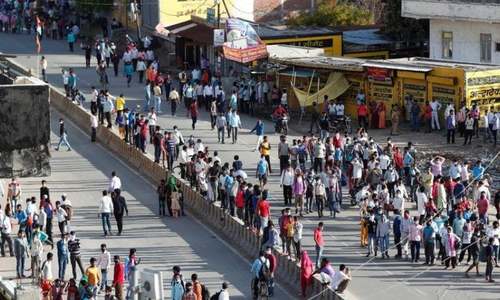Indians respond to Modi's call, light lamps to 'challenge darkness' of corona crisis


Millions of Indians switched off their lights and came out onto their balconies and doorsteps with lamps, candles and flashlights on Sunday, responding to Prime Minister Narendra Modi's call to “challenge the darkness” of the coronavirus crisis.
Modi, who last month imposed a three-week-long nationwide lockdown, asked citizens to turn out their lights for nine minutes at 9pm (local time) on Sunday and to display lamps and candles in a show of solidarity.
People across the country switched off lights. Some lit firecrackers, played drums, clapped and chanted slogans against the coronavirus.
In some big cities like Mumbai and New Delhi, residents of some housing associations stood in balconies and sang patriotic songs.
India has recorded 3,577 cases of the illness, with a death toll of 83. Authorities worry that the healthcare system would be overwhelmed if the disease took deep hold in the country of more than 1.3 billion.
Many of Modi's supporters praised the “show of lights” by sharing pictures on Twitter of their neighbourhoods and saying it felt like Diwali — the annual Hindu festival of lights.
Along with pictures of residents lighting candles, however, videos also emerged of people holding torches, chanting 'Go back, go back, China virus go back". Social media users who shared the video described them as supporters of the ruling Bharatiya Janata Party.
The prime minister's call also drew criticism from people who called for steps to help millions of daily wage earners squeezed out of a living amid the lockdown, which was imposed nationwide on March 25.
“Only a brain-dead country can celebrate with lights and firecrackers at the time of a pandemic, while millions are jobless and hungry and in real fear of death,” Twitter user Ashok Swain said.
Modi's lights-out plan put enormous pressure on officials manning power generation stations and the national grid. They scrambled to increase staffing to ensure that the sudden gyration in power demand across the country did not lead to any power surges or outages.
India's Power System Operation Corp (POSOCO), which oversees the national power grid, had ordered all senior officials to be present at generating stations, substations and load despatch centres across India between 6pm and 10pm on Sunday.
The country's electricity demand fell more than 25 per cent to 85.3 gigawatt (GW) from 117 GW within a span of four to five minutes as people switched off lights, said Power Minister R.K. Singh, adding the transition was handled smoothly by engineers.
India's power consumption has already plunged over the last 10 days, as the lockdown has forced most industries to suspend operations.













































